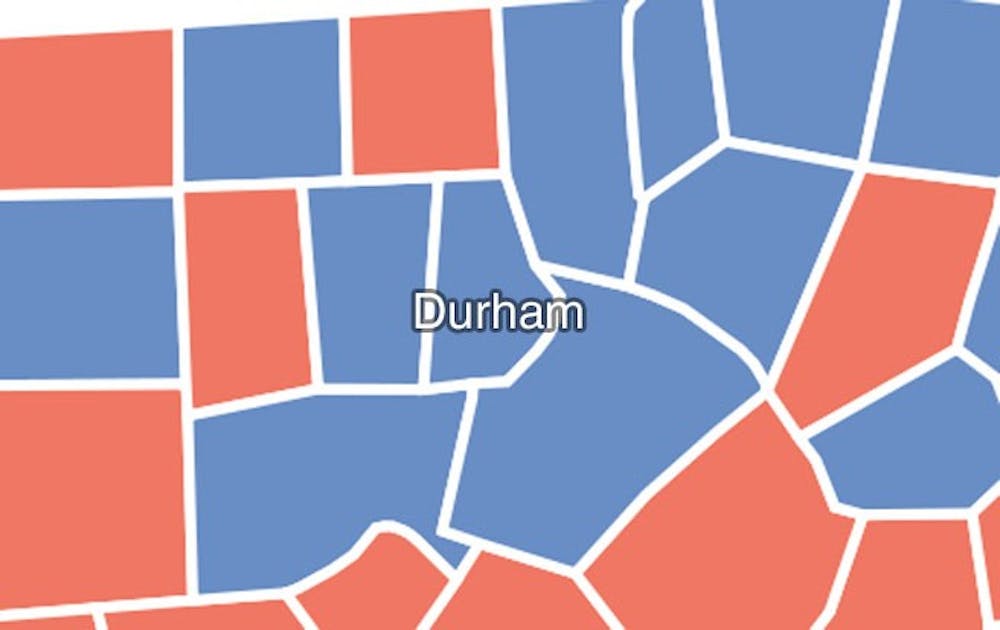Durham continues to bleed blue in a traditionally red state on the eve of the presidential elections.
North Carolina voted for Republican presidential candidates in seven elections in a row before President Barack Obama won the state by just over 14,000 votes in 2008. Unlike its rural neighbors, however, Durham County has historically voted Democratic in state and national elections. This disparity stems from Durham’s history, ethnic diversity and progressive institutions like Duke that draw people to the area, said Democratic Rep. David Price, the former Duke professor who represents North Carolina’s 4th Congressional District.
“There isn’t a formula for statewide [Democratic] victory that doesn’t include Durham,” Price said. “It is a tradition that we consider ourselves the New South with this inspiration of being more forward-looking and building for the next generation.”
In Durham County, 59 percent of voters are registered as Democrats and 24 percent are registered Republicans as compared to, for example, the 21 percent registered Democrats and 56 percent registered Republicans in nearby Yadkin County, according to data from the N.C. Board of Elections.
Durham’s progressiveness stems from its history as one of the last of the state’s southern towns to emerge, developing only after the Civil War, said Mac McCorkle, former Democratic political consultant and associate professor of the practice of public policy. A growing tobacco industry built a black middle class by offering better job opportunities than the textile industry.
Surrounded by two universities, Durham developed as a working-class town where most of the well-paying jobs were in the cigarette and tobacco industries, said Phail Wynn, vice president for Durham and regional affairs. He added that these two factors have contributed to the county’s long-standing progressive tendencies.
The combined presence of Duke and the large black population gives the county two of the strongest contemporary Democratic coalitions in one place—African Americans and people with a graduate education, McCorkle noted.
“Durham is a more hospitable place to Hispanics, African Americans and gays—a hospitality signaled by this post-grad ethos,” McCorkle added.
This population demographic attracts more liberal residents to Durham. he said. When the local politicians are liberal because of local coalitions, more liberal-minded people move to an area.
The county’s competitive businesses also attract employees from across the nation. Durham’s numerous businesses and job magnets, like Duke and its medical system, have brought an influx of people who are not from North Carolina, said political science professor Peter Feaver, who served on the National Security Council for former President George W. Bush. Durham companies compete nationally for employees, whereas companies in rural areas tend to draw from local populations instead.
“That creates a geographic diversity outside the metropolitan areas, and that is different from the more traditional North Carolina,” Feaver said.
Durham’s relatively urbanized population tends to be more Democratic, whereas suburban, exurban and rural voters tend to favor Republicans, he added.
In the 2008 presidential election, 75.6 percent of votes cast in Durham county were for Obama, contributing to his narrow win in North Carolina, according to data from the N.C. Board of Elections. But many recent polls have Obama losing the state—the New York Times classifies North Carolina as a Republican-leaning state for this election.
“North Carolina is one of the two states that Obama won very narrowly in 2008, and we know that nationwide his support is much weaker than it was four years ago,” Feaver said. “You would expect him to lose the state that he won very narrowly because he hasn’t expanded his support base.”
But others think that the state could vote blue for the second presidential election in a row. The Obama campaign continues to rally North Carolina voters, sending first lady Michelle Obama and former President Bill Clinton to the state on the eve of the elections.
“I believe as in 2008 it could happen again,” Price said. “If that weren’t possible, you wouldn’t see Clinton and Michelle coming to the state in the past week. It’s still within reach.”
Get The Chronicle straight to your inbox
Signup for our weekly newsletter. Cancel at any time.

